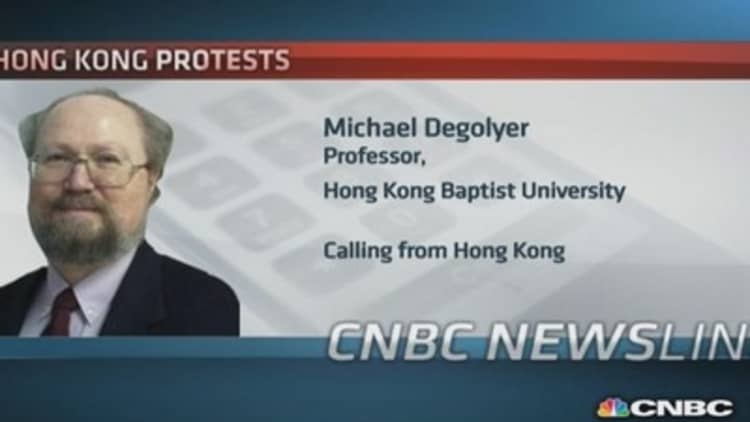China remains mum amid Hong Kong's worst uprising in decades, but as pro-democracy protesters prepare for the long haul, speculation over how mainland authorities will tackle the issue is mounting.
Although the risk of international criticism would likely deter China from intervening with force, analysts say President Xi Jinping will be keen to maintain his reputation as a strong leader with zero tolerance for unrest, putting him in a tricky position.
The week-old nonviolent protest escalated on Sunday when riot police baton-charged protesters and volleyed tear gas, alarming Hong Kong residents who are not used to such heavy-handed approach.
Read MoreWho needs who the most: Hong Kong or China?
"The Chinese leadership... has to find a way of conveying to the Chinese public that these demonstrations are minor and of no consequence. Right now, that can't be easy," Russell Leigh Moses, dean of academics and faculty at The Beijing Center for Chinese Studies told CNBC.
China's Communist Party has long suppressed anti-government views through censorship, arrests, and armed forces. In 1989, a bloody crackdown on pro-democracy students in Tiananmen Square deeply scarred China's reputation abroad and authorities will want to avoid repeating this incident.
But in Hong Kong, which is officially ruled by China under the "one country, two systems" formula, different rules apply. Residents have more freedom than their mainland counterparts and can express their views without punishment or censorship. However, their elective process is still controlled by China - a point of contention that underlies current unrest.
Read MoreInstagram blocked in China amid #OccupyCentral movement
The 'demonstration effect'
The Chinese government is clearly worried about anti-government sentiment in Hong Kong spreading to the mainland, analysts told CNBC.
Chinese authorities have attempted to censor news of the uprising since Sunday, blocking access to Instagram, where protesters have shared photos, and restricting certain internet search terms.
"Chinese leaders are very concerned about the 'demonstration effect' in China," Joseph Y.S. Cheng, professor for the Contemporary China Research Project at the City University of Hong Kong, told CNBC.
"[They] have probably planned the anti-Occupy Central campaign for a long time," he said. "I believe they have full confidence of cracking down, it's a matter of timing and tactics."

Compromise unlikely
Occupy Central - the body behind the protests - is demanding a greater say in choosing which political candidates can stand for election in Hong Kong. Currently only pro-Beijing candidates are permitted.
"It's highly likely that Beijing will not make any serious concessions," said Cheng.
Any form of compromise is unlikely to be accepted by pro-democracy protesters anyway, he said, as they seek full democracy rather than any "cosmetic" changes.
Read MoreHong Kong activists stare down 'Great Firewall of China'
Chinese authorities already missed an opportunity for compromise in a closed-door session between Xi Jinping and Hong Kong business leaders last week, Michael Degolyer, director of research organization The Hong Kong Transition Project, told CNBC.
Instead of negotiating, the Chinese president reiterated that he would not allow political change in Hong Kong, the New York Times reported.
"Some sort of reform of the nomination committee, which is currently 1,200 people elected by only 230,000 out of 7.2 million people in Hong Kong," would have worked, said Degolyer.
"If they had actually come forth with some specifics [that would have helped]," he said.
Thus far, they've only made vague promises as to who might be more included in this currently highly restricted nomination committee, he added. "That's where they made their fundamental mistake."
Read MoreHong Kong protesters stockpile supplies for long haul
The Chief Executive
Somebody has to give in before the crisis is resolved, said Willy Lam, Professor of History at Chinese University of Hong Kong.
"[President Xi Jinping] doesn't want to be perceived as weak and soft towards Hong Kong, but at the same time he will lose a lot of credibility if Beijing were pushed to use the final resort of mobilizing the People's Liberation Army," he said.
Hong Kong Chief Executive CY Leung could resign shortly, Lam said, which would be seen as a concession to Occupy Central's demands. However, in theory, he could just be replaced with another pro-Beijing candidate.
"It is unlikely that any real negotiation can take place if Mr Leung is still in government. Perhaps [this won't happen] immediately - [but] Beijing has to do something to pacify the angry protesters," he said.
Using force
Fears of a severe reaction by Beijing are not completely off the table.
There are rumors that the upheavals in Hong Kong were instigated by democratic radicals supported by "anti-China forces" in Britain and the U.S., according to some Chinese media reports. This could encourage China to employ a more hard line approach, analysts said.
The garrison for the Chinese People's Liberation Army stationed in the territory has been placed on alert, the BBC reported early morning on Tuesday.


